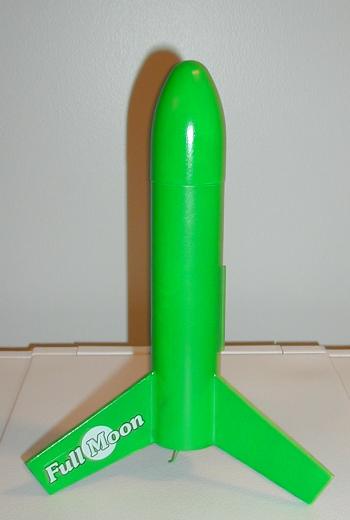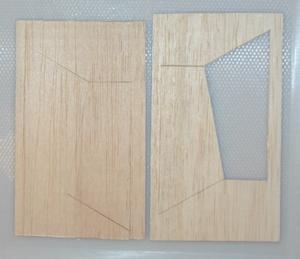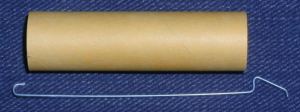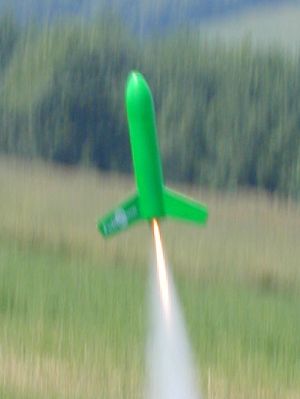| Published: | 2010-11-13 |
| Manufacturer: | Quest  |
![[Picture]](/images/archive/images/ratings/rating_quest_full_moon.gif) For those that have
followed the site for a while, you know that I enjoy
"stubby"
rockets (rockets with 10:1 length:width ration or less). I have built and flown
a lot of "stubby" rockets. Here is a comparison of
2.6"
versions, and
3"
versions, and
4"
versions. The Quest Full Moon™ is also a "stubby" rocket
standing 9.125" tall and being 1.57" body tube. This is a 5.8:1
ratio. For comparison, the Estes Fat Boy is 4.9:1 while the Estes Big Daddy is
6.3:1.
For those that have
followed the site for a while, you know that I enjoy
"stubby"
rockets (rockets with 10:1 length:width ration or less). I have built and flown
a lot of "stubby" rockets. Here is a comparison of
2.6"
versions, and
3"
versions, and
4"
versions. The Quest Full Moon™ is also a "stubby" rocket
standing 9.125" tall and being 1.57" body tube. This is a 5.8:1
ratio. For comparison, the Estes Fat Boy is 4.9:1 while the Estes Big Daddy is
6.3:1.
 The Full Moon™ is deemed a Skill Level 1 Kit for
beginner modelers. It is a fairly straightforward, 3-fins and a nose cone
(3FNC) rocket. It uses Quest-typical construction techniques and can be built
quite quickly.
The Full Moon™ is deemed a Skill Level 1 Kit for
beginner modelers. It is a fairly straightforward, 3-fins and a nose cone
(3FNC) rocket. It uses Quest-typical construction techniques and can be built
quite quickly.
The rocket includes a 6" white paper body tube, a plastic nose cone, 3 die-cut balsa fins, a motor mount (18mm) with thrust ring and retainer hook, a recovery system made up of a Kevlar® shock tether, elastic shock cord and a 14" plastic parachute. These along with a single peel-n-stick decal and a launch lug make up the rocket.
CONSTRUCTION:
The instructions are printed on 6 pages of 8½ x 11" paper. They are typical Quest instructions being well illustrated and clear. They would ensure that a builder of any level, but specifically beginners, would have a successful build. I like that the instructions also include a 4" ruler printed on the front. In addition, there is a fin marking guide that is cut out of the front of the instructions.
Since the built of this 3FNC rocket is so straightforward, I'm only going to outline a couple of areas of concern and interest.
 First, I spent a bit of time looking for my 4th fin!
You see from the picture, how one would believe that a 4th fin should be
included. The rocket only has 3 fins, so don't spend any time looking!
First, I spent a bit of time looking for my 4th fin!
You see from the picture, how one would believe that a 4th fin should be
included. The rocket only has 3 fins, so don't spend any time looking!
I was surprised at the fit of the thrust ring into the motor mount tube. It was very loose. It should be a bit loose since the Kevlar® shock tether is supposed to be tied to it. But even after this was done, it was loose. I allowed the space to be filled with glue.
Quest seemed to have changed their motor
mount a bit on this rocket. We are all familiar with cutting a small slot in
the motor tube, right below the thrust ring to install the motor hook.
 Not this time. This
motor hook is longer and the upper bend goes above the thrust ring and
wraps around it. This would solve the loose thrust ring problem! It is a good
idea, since that thrust ring will be taking the shock of the ejection since the
Kevlar®
is tied to it.
Not this time. This
motor hook is longer and the upper bend goes above the thrust ring and
wraps around it. This would solve the loose thrust ring problem! It is a good
idea, since that thrust ring will be taking the shock of the ejection since the
Kevlar®
is tied to it.
Other than those things, the build was easy. The instructions guide you through making fin fillets, sealing your balsa fins, painting, and applying the decal to finish the rocket. There are also instructions for the parachute assembly, which involves applying Gripper Fasteners to the parachute and tieing on the shroud lines.
I decided to paint my Full Moon™, Lime Green. I wanted to be able to see it! I didn't spend a lot of time smoothing the fins or hiding the spirals, but the final look is good. After applying the decal I did clear coat the rocket.
Overall, for CONSTRUCTION I would rate this kit 4 ½ points. It is a straightforward build. Not much else to say.
 FLIGHT/RECOVERY:
FLIGHT/RECOVERY:
Quest recommends the A6-4 (first flight), B6-4 or the C6-5.
Quest also indicates that the weight of the Full Moon™ is 1.06 ounces. Mine weighed in at 1.6 ounces.
Lastly, Quest indicates flights to 900 feet. On a C6-5, mine simmed to 933 feet.
My first flight was on an A8-3. It was stable and fun to watch. The 14" parachute for this light rocket carried it for a bit (even with the A8-3 altitude). From this test flight, I determined that if I wanted to keep this rocket, the parachute must go.
After adding a 24"x1" Lime Green streamer (tree marking strip from the hardware store) I was ready to fly it again. So I loaded a B6-4. Another stable flight. The 4 second delay would have been better at 5 seconds, but for a small rocket, no issues. The streamer made it easy to follow and there was no damage on the landing.
The last flight for the day was on a C6-5. It went way up there and I noticed it flying straight but with a spin all the way up. Again, with the Lime Green and long Lime Green streamer, it was easily tracked and recovered.

The Quest Kevlar® and elastic recovery system is excellent. Over the years, this system seems to be better than the typical 3-fold paper and elastic system for other rockets that I have flown.
For FLIGHT/RECOVERY, I would rate this rocket 4 points. The parachute is too big for this rocket. Quest would do well to include a long streamer. Otherwise, it is a solid flying bird.
I give the rocket an OVERALL rating of 4 ½ points. Being a "stubby" rocket drew me to purchase it. It looks good and flies good, so other than preference for recovery (wanting not to loose it), the rocket is solid.
Other Reviews
- Quest Full Moon By Bill Eichelberger (April 5, 2015)
Picked up as an afterthought back in the days when Quest products were still available in local retail outlets, the Full Moon languished in my kit storage cabinet for several years before catching my eye one cold winter night when I was in the mood to build something quick. The Full Moon seems to me to be the Quest version of the Baby Bertha, a kit that I've got a long and loving ...
- Quest Full Moon By Chan Stevens
A miniaturized version of the Big Betty, this little guy is a quick, easy build and reliable flyer. The parts list includes: Plastic nose cone BT-60 (equiv.) body tube 3 Laser-cut balsa fins Centering rings 18mm motor tube Metal motor hook Thrust ring 14" plastic chute Kevlar ® /elastic shock cords 1/8" launch lug Peel n stick decal This was ...
- Quest Full Moon By Stan Horowitz
This is a fine sport flier! It has a nice size body tube that lets you load up the parachute with ease! Every thing in the kit was in good condition in the package. The die-cut balsa fins are of good quality and a fine grain. The plastic nose cone is like most Quest/Estes types & takes paint well. I like the Quest way of mounting the shock cord with Kevlar string to the motor mount (better ...
 |
 |
Flights
 |
 |
G.H. (May 21, 2005)
H.A.F. (July 14, 2005)
R.F. (November 7, 2005)
D.E. (April 1, 2007)
D.C. (April 25, 2008)
J.F.B. (October 27, 2008)
G.B. (May 9, 2009)
 |
 |
K.R.E. (June 16, 2003)